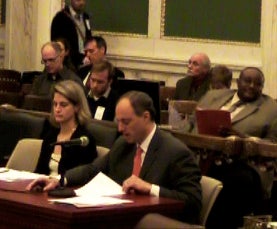Should Philly tie taxes to “green” status?

Deputy Mayor Altman and Suzanne Biemiller of the Mayor’s Office of Sustainability testify at Thursday’s hearing.
April 3, 2009
By John Davidson
For PlanPhilly
Everyone seems to agree that building “green” is a good thing to do, but not everyone agrees on how the city should go about encouraging it.
The differences became clear in hearings Thursday afternoon in City Council chambers, where the Council Committee on Finance heard testimony about a bill that would tie the city’s 10-year tax abatement program to buildings that achieve LEED (Leadership in Environmental and Energy Design) certification.
The bill, co-sponsored by Councilwoman Blondell Reynolds Brown and councilmen Curtis Jones and Bill Green, was introduced March 5 and would condition the tax abatement on the level of LEED achieved by a developer: 100 percent abatement if a building attains LEED Platinum certification (the highest possible rating), to ten percent abatement for LEED Certified (the minimum rating). Residential and commercial construction and renovation projects that did not go through the LEED process would not be eligible for any property tax abatement.
Deputy Mayor Andrew Altman was up first to give testimony. He said that while the Nutter administration supports efforts to incentivize energy efficient buildings, altering the abatement program is not the right way to do it. Restricting the city’s tax abatement program by tying it to LEED ratings would, Altman said, “have significant unintended and negative consequences for development.”
Specifically, the Nutter administration is concerned about the proposal because the LEED rating process happens after a building is constructed, not before, “and developers need certainty about future property taxes so that they might build those costs into their development pro formas,” Altman said.
Another Altman concern: Because Philadelphia’s building codes do not match LEED standards or other, similar energy efficiency standards, it would make the city dependent on private inspectors. “In effect, control of Philadelphia’s tax incentive decisions would be placed in the hands of the private sector.”
But not everyone thought this was a bad thing. Shari Shapiro, an attorney who specializes in green building law and works for Obermayer, Reibman, Maxwell & Hippel, said that administering a green building system would require expertise and resources the city simply cannot afford right now. So using a third party certification system like LEED is actually a better option, Shapiro said.
“Deputy Mayor Altman and the council knows that L&I is stretched thin as it is, and that all developers in Philadelphia have bemoaned the length and the process it takes to get buildings certified,” she said. Using market-based experts to certify buildings as green, Shapiro argued, would enable the city to implement an abatement program without extra costs to taxpayers.
More than one person speaking before the committee mentioned that several other cities, including Baltimore and Washington, D.C., have recently enacted similar tax incentive programs for green buildings, and that many use LEED as their standard. Sandy Wiggins, cofounder of the Delaware Valley Green Building Council and Chairman of e3bank, said that 122 cities nationwide use LEED as a means to govern public policy relating to green buildings.
“This is the best use of LEED as a public policy measure, as an incentive, not as a mandate,” Wiggins added. “You heard some concerns earlier from Mr. Altman about LEED not aligning with building code–it was never designed to do that. Building code is the least you can do without breaking the law, and LEED was designed as a leadership standard, which takes you beyond that in terms of environmental performance.”
Wiggins mentioned that there are ten cities across the country currently using LEED as part of some kind of tax abatement program. He noted that Baltimore has a ten-year, 100 percent tax abatement for commercial buildings with LEED Silver certification.
“I think the legislation in front of you today is very important for Philadelphia,” Wiggins said. “We are not in a leadership position; we’re lagging behind the rest of the country when it comes to green building.”
There was one thing agreed upon by Wiggins, Altman, and the more than a half dozen others who testified Thursday, from lawyers to economists to commercial developers: Encouraging energy efficient construction in the city should be a priority. Suzanne Biemiller of the Mayor’s Office of Sustainability said her office has been working on a plan to encourage green development, which it will announce in late April.
Contact the reporter at jddavidson9@gmail.com.
WHYY is your source for fact-based, in-depth journalism and information. As a nonprofit organization, we rely on financial support from readers like you. Please give today.



